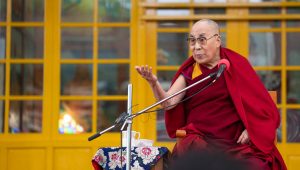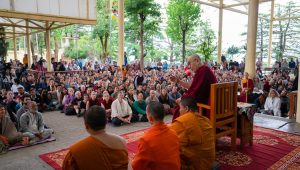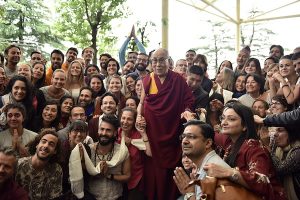
Photo: OHHDL
His Holiness the 14th Dalai Lama, the spiritual leader of Tibetans and Buddhists around the world, met and spoke to over 1,500 tourists visiting Dharamshala from 68 countries in the courtyard of Tsuglakhang, the main temple of the Tibetan community living in Dharamshala, on April 16.
His Holiness started by saying that all seven billion human beings in the world are the same. He said that science has proven that basic human nature is compassionate, so there is hope. “Constant anger and hatred is eating our immune system” added His Holiness, saying that cultivating a compassionate heart is good for health. His Holiness pointed out that young children do not care about differences of nationality, religion and so on but that as they grow up, the education and social systems seem to change perceptions as they focus on differences such as religion and nationality which come to play an important role in people’s lives.
His Holiness spoke of India, saying “There is the so-called caste system – and the time has come to acknowledge that the Indian constitution gives all citizens equal rights. So there is no room for discrimination on the basis of caste—we are all brothers and sisters”.

Photo: OHHDL
Speaking about tackling emotional crises, His Holiness said that while all human beings experience anger and hatred, we all have the potential to cultivate compassion, forgiveness and tolerance. “Destructive emotions are based on ignorance […] Constructive emotions like love and compassion are supported by reason, so we can use our brains to develop and strengthen them,” said His Holiness.
His Holiness advised people in the audience who are studying Buddhism to read the sixth and eighth chapters of the Guide to the Bodhisattva’s Way of Life by the great Indian master Shantideva, as this will help counter anger and self-centredness. His Holiness said he has read this book repeatedly since he first heard its explanation in 1967, and it has helped him transform his mind.
He then spoke about how modern education systems focus on materialism while neglecting basic human values. Again, he used India as an example, saying that the ancient Indian tradition, even before the Buddha’s time, had a rich understanding of the workings of mind and emotions. His Holiness said that cultivating inner peace is the basis of self-confidence and that children should be taught about inner values and moral principles rather than a self-centered attitude.

His Holiness with foreign tourists
Photo: tibet.net
Responding to a question from an audience about the current campaign to call for his return to Tibet, His Holiness said that it is more important to work on the preservation of the Tibetan language and culture. He said that the Tibetan language is the only language in which the ancient knowledge and traditions, which originally stemmed from India, are being preserved. He said that it is crucial to preserve this heritage.




 Print
Print Email
Email